As a kid, when others were watching MTV (I remember the first time I saw “Baby Got Back,” before it was banned, at my sitter’s house), I was watching a math-based children’s program called “Square One TV.” I was always a bit of a math junkie, and the show had it all: music videos by famous singers, recurring segments, corny humor, and the cornerstone at the end of each episode, Mathnet. Continue reading
Category Archives: The Web
Rebecca Black finally makes obvious follow-up: ‘Saturday’
It’s taken almost three years, but internet viral sensation Rebecca Black, almost universally panned for her song “Friday,” which ignited careers that both her and producer Patrice Wilson have heavily leveraged since, has finally, after a bunch of follow-up singles, come around to making “Saturday,” the proper follow-up, and of course released Saturday. Continue reading
Amazon’s ’25 Days of Free Holiday Songs’ returns
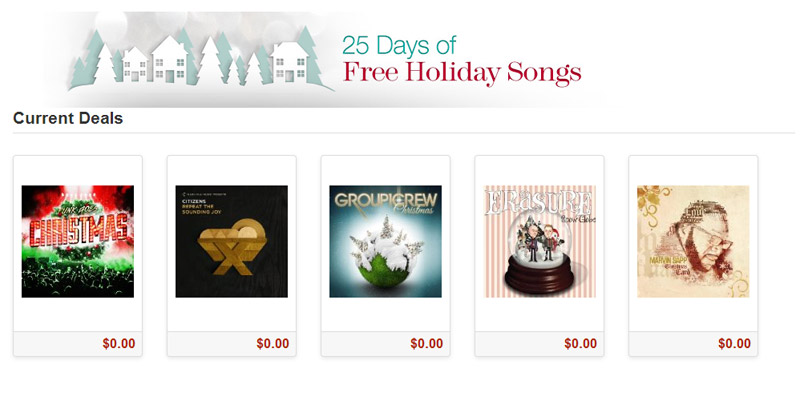
Last year, I shared with you Amazon’s 25 Days of Free Holiday Songs, a recurring promotion they have offered which features 25 free MP3s to download for the holidays. The good news is it’s back, and the mixed news is it’s about as good as last year’s batch. Continue reading
With Thanksgiving one week away, how about a tune?
I wrote about Nicole Westbrook here when her second song, “Smile,” came out, but this one kicked things off a year ago. If you’re not ready for Christmas music yet, how about “It’s Thanksgiving” to keep you going? Continue reading
Patrice Wilson emerges from the silence with ‘Chinese Food’
For those who can’t get enough of the insanely ridiculous Patrice Wilson will of course dig the latest entrant, “Chinese Food,” which follows in the same pattern as his other songs. Not much to say here other than enjoy, or hate, as the case may be.
Bought it in print? Get a digital copy.
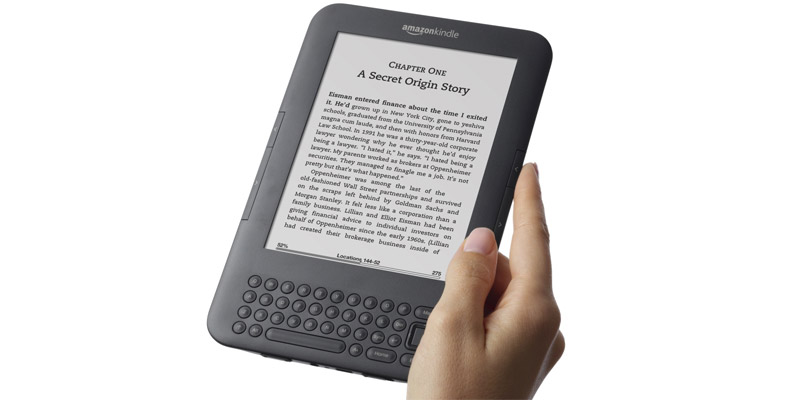
Awhile back, I wrote about a technology that let Amazon provide customers a digital copy of CDs previously purchased through the service. That service is now expanding to Kindle copies of books previously bought in print. The catch with the MatchBook service is that in many cases customers will need to pay a small fee to get the Kindle copy, but the fee (when required) will range between 99 cents and $2.99. Continue reading
Wendy’s training videos, back in the day
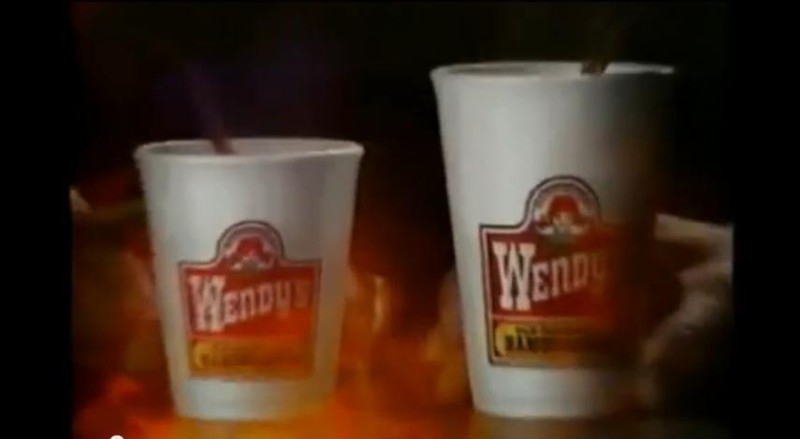
Yesterday, a Gawker writer posted one of Wendy’s training videos as a big find. I definitely have seen them passed around in the past (they’ve been on YouTube for a few years), and thought I had written about it on one of the old blogs, but can’t find anything. For those who haven’t seen them, they’re pure gold. Continue reading
Seeking the elegant solution: Amazon reviews
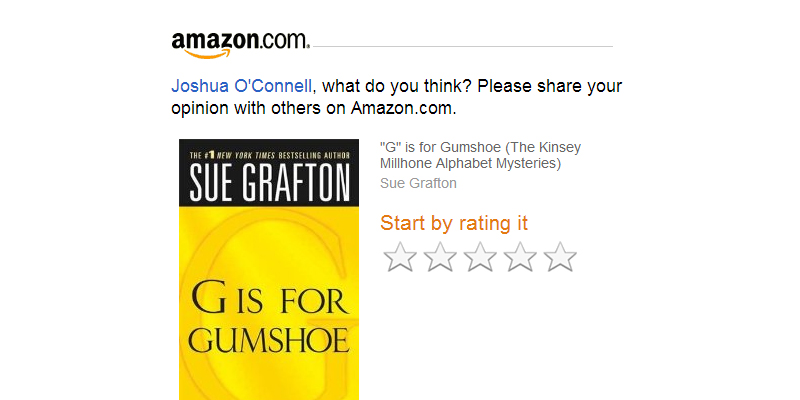
A recent Amazon promotion for Kindle books piqued my interest: They put the first 15 stories in the famous Sue Grafton series on sale for $1.99 each. Having seen them for years, and knowing they’d probably be in my wheelhouse, the investment to get going with the series was low enough to take the plunge. Continue reading
The price to pay for streaming music
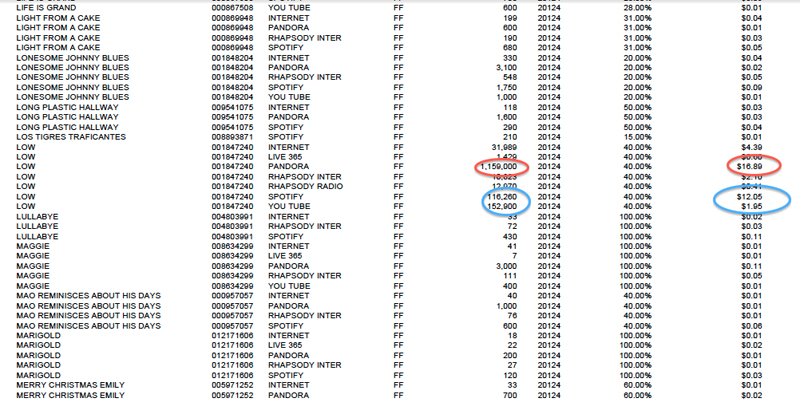
I was a bit intrigued by a post at the A.V. Club about how much an artist was paid for his song being streamed at services like Spotify. The article’s big splash was that, despite a million plays and then some, Cracker’s lead singer was only paid $16.89 by Spotify for those plays. The article then compared the amount to other services:
Terrestrial radio earned Lowery more than $1,000 for about 19,000 plays. Sirius XM paid him about $180 for 179 plays, technically making it the most profitable. Spotify and YouTube were more on par with Pandora, doling out $12.05 for 116,000 plays and $1.95 for 153,000 plays, respectively.
Initially I was as shocked as the majority of people in the comments section, but then it hit me: Isn’t a play on radio or Sirius XM a boatload more exposure than on Spotify? Some quick math approximates a penny for every thousand listeners on Spotify; by comparison, radio’s paying 5 cents per play… does the average play on radio net roughly 5,000 listeners? That seems reasonable enough. Sirius XM was close to a dollar per play, which would mean 100,000 listeners would need to be listening to be comparable. Now that definitely seems like more of a stretch, but it’s a national service, so there’d assumedly be more listeners than on a radio station, so it’s hard to compare.
It’s certainly something to be sympathetic about, particularly when the argument can be made that services like Spotify are a replacement for purchases for a growing segment of the population. (Of course, the record companies are only hurting themselves by changing purchases in the physical era, complete with resale rights, to non-transferable licenses in the digital era.) But to compare amount paid per play alone is a bit simplistic, and in many cases, services like Pandora, which act as a discovery mechanism, can lead to incremental sales – I know I’ve bought songs that I tripped across because Pandora recommended it. Spotify’s more shaky, but if Spotify encourages more consumption, is it a bad thing? And further, given the way things were going a decade ago, where Napster was invading college campuses and students were building libraries of music for free, isn’t having Spotify as an option for those people better than nothing at all?
This isn’t to say the rate is fair; it’s never really been all that fair for artists, and the switch from mass market to individualized control causes segmentation and splintering. But a broad comparison rarely tells the whole story.
Marking a set of anniversaries

Yesterday, I noted that I moved from Virginia to Connecticut 20 years ago this month. It occurred to me earlier this month that a number of personal milestones fall in June, for whatever reason; not just graduation from high school and the obvious stuff, but bigger things. Continue reading